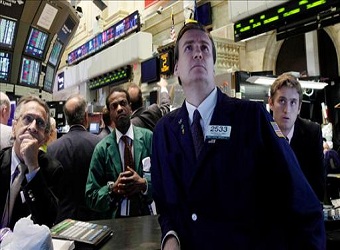U.S. stock indexes closed at all-time highs, extending their record run as consumer-spending data reinforced perceptions that the U.S. economic recovery is poised to accelerate in 2014.
The S&P 500 SPX +0.53% closed 9.30 points, or 0.5%, to 1,827.99, near its intra-day high and record close. The Dow Jones Industrial Average DJIA +0.45% advanced 73.47 points, or 0.5%, to 16,294.61, marking its 48th record high this year. The Nasdaq Composite COMP +1.08% jumped 44.16 points, or 1.1%, to 4,148.90, aided by a substantial rally in its largest component, Apple Inc.
Both the S&P and the Dow industrials closed at record highs on Friday.
Stocks jumped last week when the Federal Reserve decided to begin scaling back the size of its monthly bond purchases in January.
Investors “should remember that the Fed is reducing the pace of asset purchases expressly due to a strengthening economy,” said Jerry Webman, chief economist at Oppenheimer Funds, in a note.
“Markets apparently get that now, whereas last May, when the Fed first indicated it was preparing to taper, the reaction was broadly negative at first, though growth-oriented asset classes and subcategories rebounded fairly quickly,” he said.
Meanwhile, data released Monday showed U.S. consumer spending outpaced a modest rise in personal income. Consumer spending rose a seasonally adjusted 0.5% last month, the fastest pace since June and in line with expectations. However, personal income only rose 0.2%, below the 0.4% gain that Wall Street economists had anticipated.
Separately, consumer sentiment rose this month to the highest level since July, according to University of Michigan/Thomson Reuters consumer-sentiment index, which hit 82.5, mostly in line with expectations.
Speaking Monday on CNBC, Richmond Fed President Jeffrey Lacker said his forecast for the trajectory of the Fed funds rate is the third-highest among members of the Fed. He expects the rate to hit 2% by the end of 2015, from its current target of near zero.
“I put early 2015 for when the Fed funds rate will lift off but that is something that can change one way or another,” Lacker said.
He also praised the central bank’s decision to reduce monthly asset purchases from $85 billion to $75 billion, adding that the impending departure of Fed chairman Ben Bernanke had “nothing at all” to do with the decision to taper its stimulus program.
“Given the data, given the way the committee positioned itself over the program. this decision was kind of a slam-dunk,” Lacker said during the interview.
Source: Marketwatch


